#Metadata Catalog
Explore tagged Tumblr posts
Text
From the post:
"...Still, the fact remains that these domineering name changes are now reflected not only in many US catalogs, but in library catalogs across the world. Power has been taught that even if they’re not looking very closely, the Library of Congress will change its vocabularies to reflect the capricious whims of the president, no matter how euphemistic or jingoistic.
"In the 1930s, future Librarian of Congress Archibald MacLeish wrote about the rise of anti-communism: “The real struggle of our time was not between communism and fascism but the much more fundamental struggle between democratic institutions on the one side and all forms of dictatorship, whatever the dictator’s label, on the other.” Does our current Librarian of Congress have as much strength of conviction?"
The author, Violet Fox, is the creator of the Cataloging Lab.
#libraries#LCSH#Library of Congress Subject Headigs#LoC#Denali#Gulf of Mexico#cataloging#metadata#subject headings#library catalogs#OPACs#the power to name#library workers#librarians#tumblarians#do not comply in advance
25 notes
·
View notes
Text
the thing that is currently frustrating me about my work is that i have no formal cataloging training beyond a class on very basic marc cataloging which i had mostly already learned from my assistantship. and yet i have two jobs where most of my duties are cataloging or cataloging adjacent but i lack so much of the vocabulary to communicate the concepts even if i know the basic workflow. which results in not feeling like i’ve earned these positions or belong here at all.
#and they’re not even offering the advanced metadata or cataloging classes where i could learn these things#because the administration of this program is basically disintegrating
7 notes
·
View notes
Note
love the artifacts tag. you ever hear of nicanor parra's artefactos? it reminded me of it
oooh cool!! thank you! i had not heard of it but ive downloaded a couple pdfs now 👍
the artifacts tag was originally my tech tag based on artifacts and artifacts and artifacting, which then translates nicely to include things like physical palimpsest texts and then i lost the plot and started throwing in things ancient or preserved or cataloged or textually complex or linguistics or math or especially technical fiber art or
#artifacts i think is: A process has occurred (and you can see it).#as someone who does metadata in school and will probably do metadata for work i enjoy doing it counterproductively on my blog#well. counterproductive as a finding aid to anyone who isnt me. my other favorite on this blog is Red with two criteria:#1. has the color red somewhere in it. 2. invokes the feeling of awe at seeing red. this leaves out a lot of art that uses red well but#doesnt gutpunch you with it and includes a lot of art with fairly minimal red usage. would be unacceptable in an actual art catalog#[post]
2 notes
·
View notes
Note
Hey! I'm a fresh-out-of-undergrad prospective MLIS student. I love your blog and am reaching out to ask for any advice you personally have about applying to MLIS programs, and also figuring out your passion within the larger field that is librarianship. No matter how hard I try I keep getting sucked into the cataloguing/metadata side of things, and I'm trying to break free and explore other options. Also, I was wondering if you have any connections to the Fan Culture Preservation Project? For some reason I feel like I've seen you writing about it (or maybe it was ao3cassandraic, who I also follow religiously) and I'm really curious about it.
For applying to LIS degree programs, do some research into what courses and specializations a university offers, and if you’re in the USA see if you can find a solid program in your state. I was accepted into three LIS masters programs. Two of them had solid programs for me, but one was out of state and one was in state - out of state programs mean you’re paying more in tuition. Also, ask about fellowships and assistantships, those can get part of your tuition covered. I chose a program that was in-state and offered me a fellowship to cover 2/3 of my tuition as long as I kept my grades up.
I personally encourage trying to find an in-person program if you can. Online programs can be wonderful, but there’s hands-on experience that you can only get with an in-person degree. If you’d rather do online, see if you can get a job at a library and pursue the degree part time while working. (Some libraries will pay for your LIS masters if you work there full time while taking classes, but don’t count on this.)
For finding your passion in the field, start getting your feet wet in libraries. I STRONGLY discourage jumping straight into a library masters degree without volunteering or working in a library for at least a year first. You could tell who had practical experience and who didn’t among those in my program, and those with experience had fewer struggles when applying to jobs after graduation. A good program will have opportunities to work in libraries on campus while pursuing your degree, and you should try for those jobs, but you really want that practical experience beforehand as well. One piece of advice I got from a friend that was useful: once you start your degree, try to take courses that don’t overlap with your work. For example, if you find work in cataloguing at a library on campus, skip the cataloguing class and take a class on archival preservation or a class on digital curation.
I’m not currently connected to the Fan Culture Preservation Project, I actually hadn’t heard of it until just now.
#I understand loving cataloging and metadata#I have a sideblog devoted to it that’s older than this blog#thanks for the ask!#library#libraries#librarian#not librarian
21 notes
·
View notes
Text
oh yes i am having a wonderful sunday. hmm? what am i doing? thinking about knowledge management systems and mental models in the digital age, and how they might evolve as our technology advances (or, honestly, crashes) of course
#hierarchical structure vs webbed#hierarchical is typical (computer file folders) but requires one to remember the top level#webbed is more dynamic#but ofc the star of the show no matter what is metadata#cataloging and classification my beloveds#i am investigating the zettlekasten system rn and i am intrigued#so like: zettlekasten was developed physically but became more approachable in the digital age bc we can know take advantage of software#(ie obsidian) that makes it easy to input recall and connect notes. it's all very fascinating to me good thing this is my whole career
13 notes
·
View notes
Text
me, whispering to myself: you don’t need fo volunteer more places
also me: but this community library needs me!!
#i have cataloging and metadata skills#and i want to give back!#and i feel like volunteering with tech skills is rarer than customer service#anyway i am contemplating#maria blabs
0 notes
Text
Mastering Microsoft Purview Workflow: Revolutionize Your Data Governance
Dive into the world of Microsoft Purview Workflow, a key to mastering data governance. Learn how it automates data integrity, compliance, and collaboration, revolutionizing your organization's data management practices for unparalleled efficiency and sec

View On WordPress
#Asset Attribute Management#Audit Trail Documentation#Automated Data Validation#Change Management Processes#Compliance Strategies#Data Asset Updates#Data Cataloging Techniques#Data Governance#Data Integrity Assurance#Data Management Policies#Data Quality Management#Data Stewardship Practices#Data Update Escalation#Metadata Management#Microsoft Purview#Organizational Efficiency#Regulatory Compliance#Stakeholder Notification Systems#Workflow Automation
0 notes
Text
I spent most of my MLIS program yelling at my professors about tag wrangling, and now I work in library software interface design. :)
I just spent 2 hours debating and testing and arguing in circles and bitching about library catalogs with two colleagues and I just want to say
AO3’s website is really, really, really impressive, functional and ergonomic and cohesive. the tag system is INCREDIBLE and AMAZINGLY maintained. this is my professional librarian appraisal.
I’ve found 1 library catalog that meets my standards. even the national library of France’s catalog is shitty in comparison to ao3.
praise.
#ao3#tag wrangling#tagging#metadata#libraries#library classification#taxonomies#curated folksonomy#MLIS#cataloging#listen I can talk for an hour about how fucked up fiction classification in libraries is and barely stop for breath
14K notes
·
View notes
Text
I love this blog post, and how the author, Erin Blake, goes in to the way that catalog and documentation are such an important and vital part of provenance-- and how a text might have progressed over its life cycle.
It also links out to the Folgerpedia, a free resource where I anticipate eventually doing a research freefall at some later point.
#libraries#tumblarians#library workers#Folger Shakespeare Library#rare book librarianship#special collections#rare books and special collections#basically old books with weird life cycles that can be so fun to research because they give you little peeks into book history#book history#cataloging#metadata#also an illustration of why metadata is so important dear gods people DOCUMENT EVERYTHING if you break stuff apart#and want it to get back together again
5 notes
·
View notes
Text

SimPrint | Newspapers, payphones, and extras for TS3!
The SimTimes finally found room in their budget for color printing of their newspapers! The bad news is, no one reads them anymore. Maybe they'll start now? In other news, The SimNation Telecom Company has been required by law to reactivate disconnected payphones to promote accessiblity to phone connectivity for all. Here's a quarter - go tell someone who might care! Important info and download 💾 under the cut:
This is an assortment of items that I worked on in 2022 and 2023. Most of this is comprised of different newspaper default replacement sets, the textures of which I converted from a few different creators. Additionally, you will find a few different things here... STC Payphone - Network Connected Original creator: Grande Lama I made this phone fully functional, and added geostates for when the phone is in use and when the handset is back on the hook. I also made this phone available in the in-game world editor, and it's flagged for use in CAW as well, so you can place it in your CAW metadata and use in worlds. It does function off-lot (as photographed!)
Crosley Simlish Serenity Payphone Original creator: ArwenKaboom (for The Sims 4 @TSR) I converted this phone and made it fully functional, and like the abovementioned phone, added geostates. I also added Simlish textures for all of the details and writing on the phone. I included the English ones too for those who might prefer them.
Functional Newspaper Stands and Dispensers Original creators: ATS3, phoebejay, alienpod, Episims, VeganKaktus, Budgie I figured I'd add the textures for the various newspapers to newspaper stands and dispensers that alienpod converted and added their textures to. They require the actual script from PhoebeJay to work. Without it, they will be decorative items. They can also be placed off-lot in the in-game world editor or in CAW. PhoebeJay's mod Simlish Bus Texture Override Original creators: FreshPrince, Lyralei As someone who probably spent half of their uni years on public transit, I was so excited for Lyralei's Bus Manager mod and was happy to test it out while testing my tennis mod. At some point I did a quick Simlish recolor override for the signs, license plates, and side-wraps, and I figured I'd share it now with this set! Lyralei Bus Manager Mod I also threw in a few deco book objects I converted from TS2 quite a while ago that I enjoy using in my lots! The newspaper default replacement texture varieties come from the following TS2 creators: Alienpod: Newspaper Defaults Epi's Sims: Newspaper Default Replacements VeganKaktus: Newspaper Default Replacement
I included replacement textures for both the reading version and the folded up versions of the newspapers. Please note that, like with my tennis default replacements, you can only have one active newspaper default replacement in your game at once. Each default includes both the reading and matching folded version. The variety is there in case you would want to switch it up between different saves and/or worlds! Making these made me so nostalgic for the early 2000s...walking to the store with a payphone outside to make an important call and getting a coke ICEE for the journey to visit grandma who has a Crosley phone in her kitchen...our sims deserve that.
Previews, additional credits, location, prices, and download links: 💾 Download Catalog: SimPrint - riverianepondsims
📰📞🚌
551 notes
·
View notes
Text

Been rewatching The Amazing Digital Circus and began to wonder, who helps Caine with all the assets and metadata? Well, wonder no longer! It's Biblia!
Small, loud, and possibly narcoleptic, this tiny owl is charge of the TADC Asset Library. It's her job to keep track of all the files Caine uses in his adventures, and to find them when needed. Of course, she and Caine have very different ideas of how the files should be organized...

No matter! She's the librarian, she'll just put it all back together after Caine messes it up again. No worries. It's not like she has a million other things to do, like upgrading and updating the files while they're dormant to make sure they're not degrading in storage. Speaking of, she pulled this one crocodile - alligator? - NPC for the fast food adventure, and something is a bit off with his code...
No need to worry. It's not like he can abstract, or spontaneously gain sentience and sapience, being an NPC, right? She'll just tuck him back in the card catalog and hopefully nothing will ever come of this little quirk! Besides, she has to make sure Jax hasn't made off with all the centipedes again...
Despite being a resident of the circus, Biblia wouldn't consider herself a 'friend' of the players. She's happy to assist them and speak with them when they come to her library (barring Jax, who has a permanent ban he ignores), but is far happier in her own company, or at her weekly tea with Bubble. As a program, she doesn't feel the same need for socializing the players do. (She's terribly fond of them, but refuses to admit getting attached. It just makes the abstractions harder...)


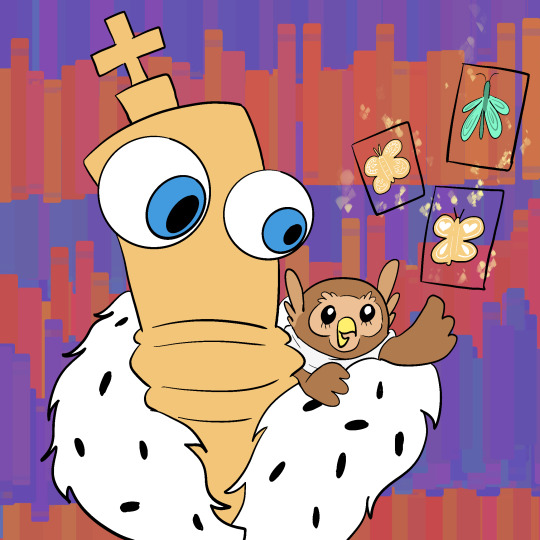


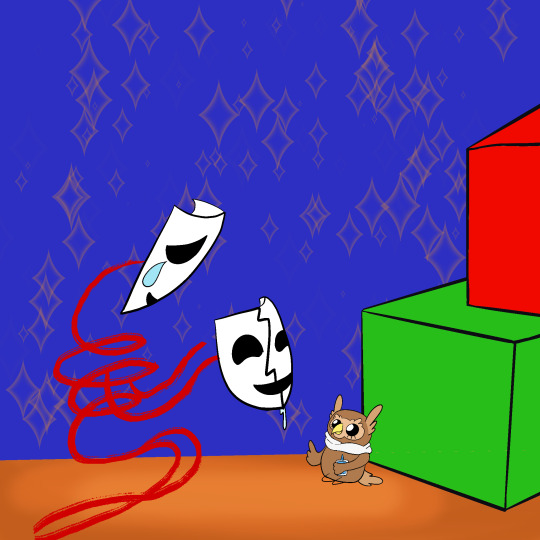
After first being created, she did question Caine about his choice of form - she is neither a toy nor a circus act. He waxed poetic about the long history in Western culture of owls being associate with wisdom, libraries and learning institutions. That made sense (in an odd-ball, Caine-like way). When asked about the size, Caine shrugged and called her travel-sized.
She didn't speak to him for a week.
Despite having access to her own metadata, thus the ability to change her form, Biblia has learned to be happy with her size, as it lets her be quick, quiet, and sneaky - all necessary things for the TADC Asset Librarian. Besides, Caine would be sad if she changed. And there are much more...educational things she can do with the metadata. Things that remind Jax why he needs to stay out of her library.

Maybe one day they'll get along, but I'm not holding my breath.
(My first time drawing the TADC cast - so much fun, and such a challenge! Loved figuring out Zooble for her picture.)
For my Master's in Library Science, in one class we had to create a classification for a specific collection (I did horror novels), as well as figure out parts of the metadata that would be used in an ILS (Integrated Library System). It was my favorite project, along with my metadata classes, so when I was thinking of what a TDAC OC would look like, the asset librarian came to mind! I hope you like her - or at least think her and Jax torturing each other is a little funny.
Cheers!
#tadc#the amazing digital circus#tdac oc#tdac jax#tdac ragatha#tdac gangle#tdac pomni#tdac caine#tdac kinger#tadc fanart#tdac zooble#tdac bubble#tdac biblia#biblia#tdac gummigoo#gummigoo#somethings not right with that croc#better keep an eye on the file just in case...
28 notes
·
View notes
Text
I love you cataloging. I love you tagging. I love you collocation. I love you search recall. I love you search precision. I love you metadata. I love you organizing.
11 notes
·
View notes
Text
So I’ve been messing with (improving) the formulas in my fanfiction database as a procrastination method for schoolwork (don’t recommend) but I think that they’re all officially working in the way I want them to? Crazy anyway so I'm going to celebrate by showing a few examples of how my Summarized Metadata formula works
So, if you caught my last two posts about my database you’ll know I track a lot of information and it was mostly done in table format like a big spreadsheet- which is fine but not exactly optimized for using it on your phone. Since then I added some buttons so I could automatically update multiple pieces of information with a click and I wanted to change the way I view information so I converted things into a gallery view and have been trying to figure out how best to present the information I want at a glance including if/then statements for information I wouldn't want if something else wasn't true idk it seems like a lot but it is what I want to be able to refer to at a glance and things link to other databases if they have the little diagonal arrow (I technically could have just had all of the properties I wanted visible but that would have meant things irrelevant to specific records would be visible too and notion doesn't have the ability for properties to be displayed horizontally so there would also be more white space than I want with numbers displayed in a line without indicators—)
Btw those previous posts are what happen when I hyperfixate on my information organization (pre-cataloging) course and this is what happens when I jump off the deep end after my programming course is too basic but I started hyperfixating on it anyway!
Anyway here is what the Summarized Metadata looks like (these also double as fic-recs if you happen to be in the 9-1-1 fandom!)
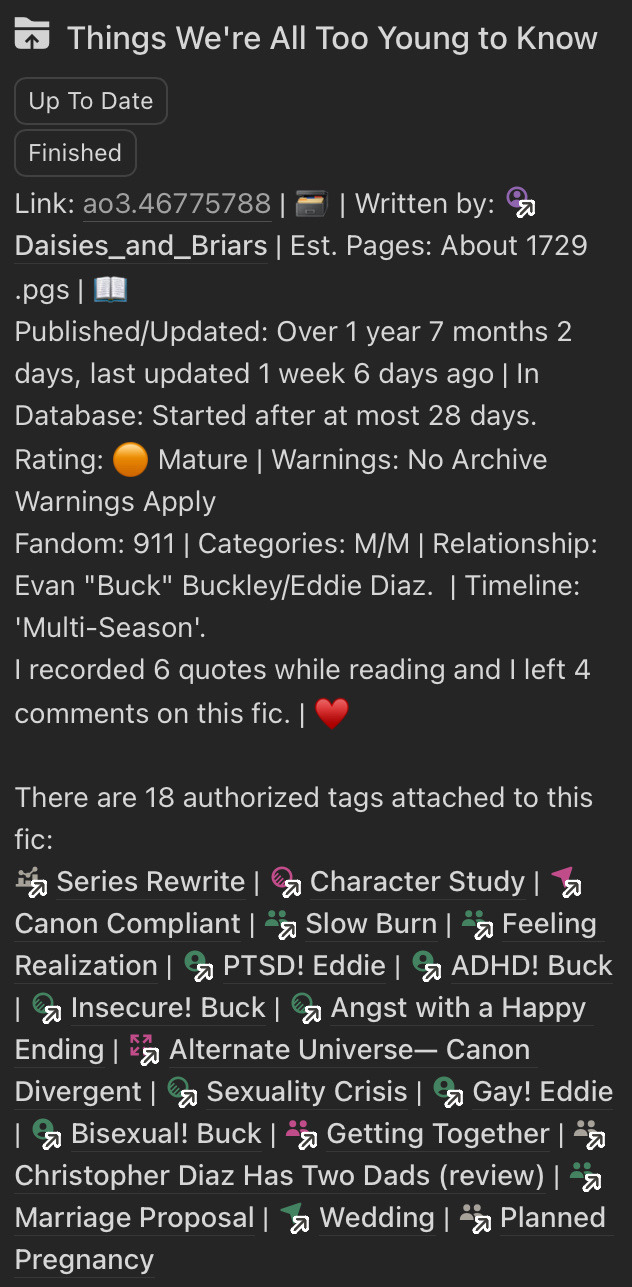
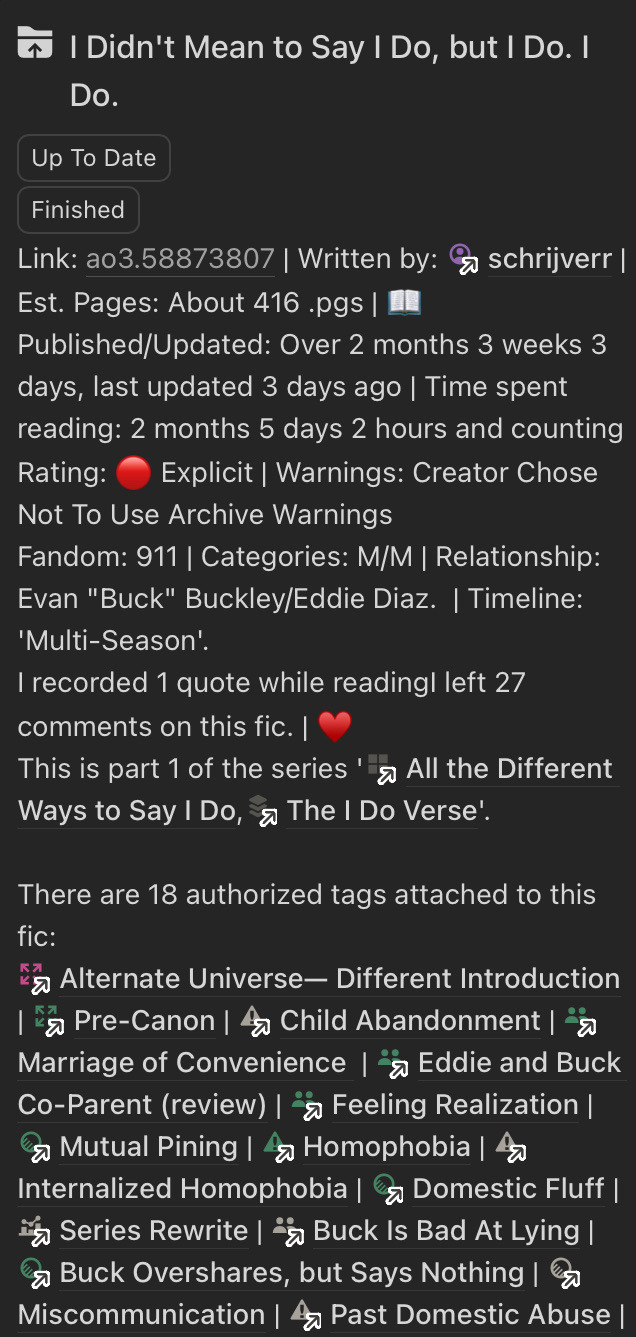
@cal-daisies-and-briars and @schrijverr are both really amazing creators in the fandom BTW so if you haven't read any of either of their work I can genuinely say I recommend all of it!
And I’ll show you one more fic I just finished and highly highly recommend because I was following it and the creator just completed it! @memequeme
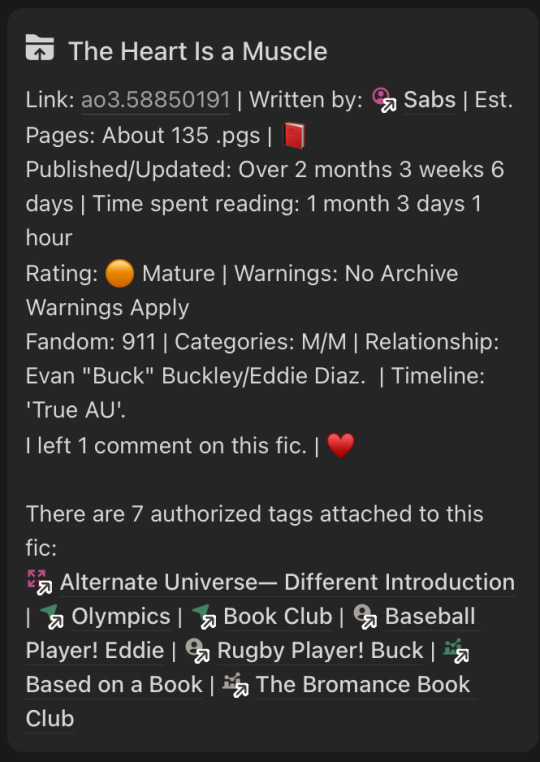
Time for sleep now!
#911 abc#fandom#fanfiction database#ao3#library science#i genuinely dont know#what to tag posts about this database?#notion#????
11 notes
·
View notes
Text
my library is migrating to a new and terrible ils this summer and i am, ugh, finally coming to terms with the fact that i am really truly going to have to find a new job because i simply cannot deal.
without getting too much into the technical details: i am a cataloger, which is essentially data entry work, and when your job involves "touching computer all day for money," you just don't want to be fucking around with an interface that requires a lot of mouse-clicking and -scrolling. there are a lot of other issues, such as a god-awfully un-accessible layout that is somehow both too much extraneous crap crammed onto the screen and too much white space, a total inability to do the kind of analytics we regularly do in our current system, the loss of a lot of our historical metadata that can't be mapped into the new system, having to redo metadata cleanup that we've already done from our last migration 8 years ago (!!!), and just, like, not being able to do basic catalog maintenance tasks like moving an item from one holding to another or properly shelf-listing non-LC call numbers. people who sit wayyy up at the tippity-top of our institutional hierarchy and know nothing about library work made this decision years ago because they thought it would save us money and the end result is going to be the enshittification of our catalog (bad for users) and our daily workflows (bad for employees).
so now i'm in this dumb and precarious position of trying to figure out what the fuck to do with my ~career~ as an overeducated 40-something woman lol. certainly this is not the worst problem in the world to have rn, but also, from my personal perspective, it is like, basically a giant cosmic turd laid upon whatever it is i've been working to build up for myself over the past ~20 years of "trying to get my life back on track." i've been at the same library for over 10 years and the job i have now is the job i had been slowly (SLOWLY) but steadily advancing towards since day one... and now i'm barely two years into the position, finally feeling a bit comfortable in my role, and this fucking software is going to make my 9-5 life absolute hell. like, i genuinely enjoy the work of cataloging, it's kind of incredible to me that they have designed a way to make it so very terrible. i'm trying not to be a total baby about this but jfc no one wants to go to work everyday and deal with a garbage-ass machine that adds 10 extra steps to your procedures and/or doesn't even do the basic things you need to do for your job, you know?
anyway, idk. i have my eye out for job postings but it all feels so overwhelming. if i want to stay in special collections, or even if i want to stay in libraries at all (precarious itself in the current political climate, har har), i would most likely have to move, and while i never expected to stay in this town as long as i have, i don't have any strong feelings about where else i might want to live, other than i'm pretty sure i don't want to live in a place with actual winter, which limits my selection because most of the special collections cataloger jobs i see are in new england or at least the northern us. (and yet! i always keep a lil window of consideration open to returning to pittsburgh because my parents are getting older and i don't know my nieces & nephews as much as i'd like to, i feel the distance more and more every year and it might be time for me to stop being so prodigal, ugh, so all there's all that thrown into the mix as well.) i remember when library school felt like an impossible goal but i did it and now i almost feel like i painted myself into a corner by specializing in the thing i wanted to do. it is slim pickins out there already, i can't afford to take a pay cut with all the debt i'm carrying, i don't know what else to do at this "stage of life" and i hate that it feels almost like a sinful luxury to even want to have a job that i don't despise & won't destroy my mental & physical health for the next ~30 years of my working life. i know that i am resilient af and i will always do what i have to do, even if that means going back to washing dishes for minimum wage again in order to survive but like, BIG SIGH, goddamn. please give a bitch a break :(
6 notes
·
View notes
Text
love cataloging love taxonomy love metadata also seeing how other people organize their shit feels like experiencing acute radiation poisoning
#this is a joke. mostly.#but I did look at some metadata we collected and went through unnameable stages of grief#and then decided to unravel that nightmare tangle tomorrow#megs vs mlis
16 notes
·
View notes
Text
Even though our pets are not allowed in the stacks, they are always working with us behind the scenes. Welcome to the Southwest Collection’s first installment of the “Archive of Pets.” This collection contains photographs depicting the cutest animals around inspecting new donations, sharing book ideas, and otherwise working hard. Thank you to our SWC Archivists/Librarians Weston Marshall, Nicci Hester, Robert Weaver, Emily Grover, Lynn Whitfield, and Rob King for sharing your pets with us!
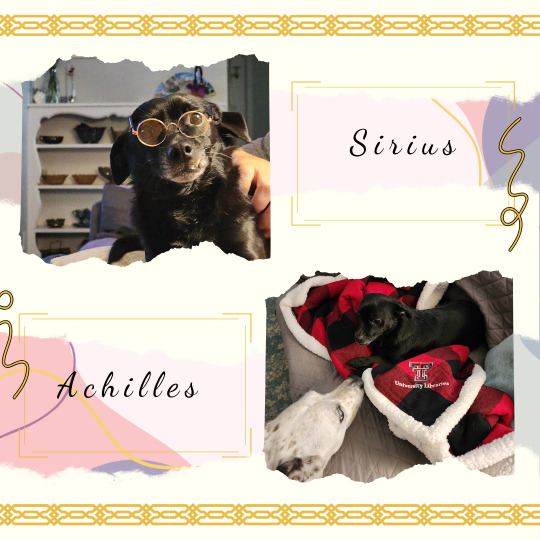
📷: Sirius appears very studious in his spectacles in the first image. The second image depicts Sirius lounging on a University Libraries blanket with Achilles looking longingly nearby.

📷: Belle is looking through our newspaper database before winding down for the day by reading “A is for Alien.”

📷: Both Mr. Biscuits and Tiabeanie Mariabeanie de la Rochbeaux Gronkwitz are inspecting archival boxes from a recent acquisition.
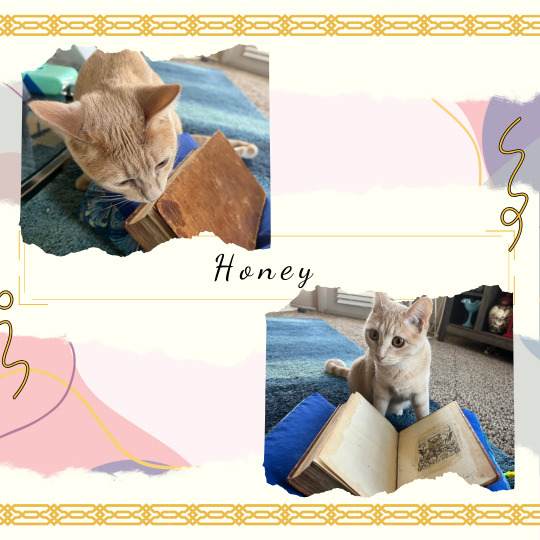
📷: Honey is taking in that “old book” smell before trying to decipher an armorial bookplate and an inscription from the eighteenth century.
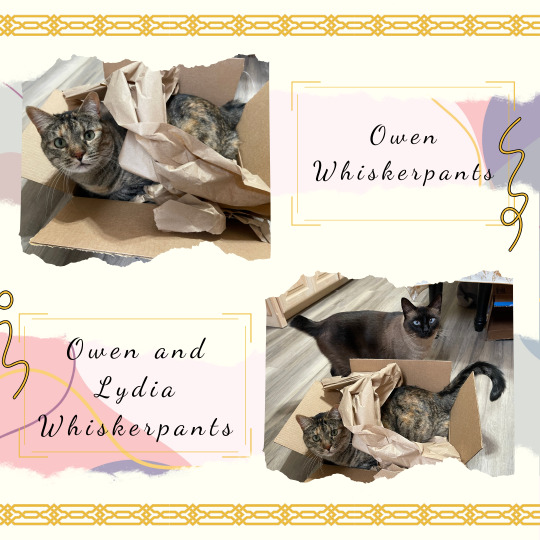
📷: Owen and Lydia Whiskerpants are both appraising the sturdiness of a box prior to it being mailed out.

📷: Franny (top) and Esme (bottom) are debating the best AV metadata scheme while Murry makes time out of his busy schedule for research and the online catalog.
#archiveofpets #behindthescenes #bookishpets #southwestcollection #specialcollections #archives
3 notes
·
View notes